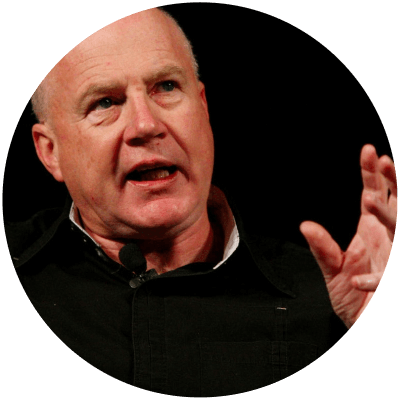Strands
Leadership Wisdom Series

Speaker Bio
Session
Q&A
SPEAKER BIO
Kevin Roberts’ outstanding professional career showcases his exceptional understanding of leadership and management.
He is the former CEO of Saatchi & Saatchi, Pepsi, and Pepsi Cola Middle East. Kevin was also a member of the management board of Publicis Groupe, a Paris-based global communications group operating in 108 countries and employing 80,000 people. During his time at Publicis Groupe, the company grew from the world’s seventh largest communications group to the third largest.
Kevin is also an honorary Professor of Creative Leadership at Lancaster University and the resident expert for Oxford University’s ‘Foundry Lev8 Accelerator’ programme in England. He is also an honorary professor of Innovation and Creativity at the University of Auckland Business School in New Zealand and honorary professor of Leadership and Innovation at the University of Victoria School of Business in Canada.
His Leadership Wisdom Series session focused on channeling the Power of Three, the differences between management and leadership and how to ensure moral leadership is at the forefront of all you do as a leader.
The Power of Three
Kevin Roberts discussed the importance of the ‘Power of Three’.
He suggested that leaders need to be able to consolidate, grasp and communicate as effectively as possible to optimise business results. Roberts’ told us how at the start of his career, he would always recite his A,B,C’s: ambition, belief and courage, which he believes is at the heart of leadership.
Roberts’ explained the differences between management and leadership by arguing that management is about doing things right whereas leadership is about doing the right things.
Roberts further offered his insight on the framework for successful leadership, categorised into seven parts:
- Leaders must inspire everyone they lead to be the best they can be in the pursuit of purpose.
- Leaders must make things happen. Getting things done is the role of the manager, but making things happen is the role of the leader.
- Leaders must create other leaders all around us, in all places and at every level. Leaders must possess radical optimism, you have to give your people hope. Hope is simply optimism based on data.
- Leaders must start with the answer and work back, when you don’t know where you’re going, all roads will take you there - instead of tactically stumbling forwards.
- Leaders must possess the ability to learn fast, fail fast and fix fast. The fastest way to learn is through failure, but a genius is someone who only makes the same mistake once.
- Leaders must build their businesses on four pillars: responsibility, learning, recognition and joy.
Q&A
How do you build a culture that allows people to fail but also learn from it and quickly?
These cultures are so important. Failure is not a stigma, it is a natural evolution to progress. The key terms are not fail and learn, but instead fix and fast. We need the mental flexibility, moral courage, will and correct culture to admit to our own mistakes and to accept failure as a path for learning and then drive for a solution. Find new ways to fail, fast ways to learn, incredible ways to fix and then you’ve got to reward that.
How do you balance doing what needs to be done i.e layoffs, and protecting people during a pandemic?
When given command, take charge and do what is right. Make the big decisions with your heart and the little ones with your head – you’ll know what is right. We are going to have to make hard choices, but make them within a moral code of values and principles and how you would want to be treated.
How can we remain optimistic in the face of global leadership that lacks any sense of ethical consciousness?
I block that out and control the controllables. We can make the difference bottom up, it doesn’t have to come top down. If we can inspire everyone we touch, to be the best they can be – optimistically I believe, we win.
What role do you see spirituality having on leadership, if any?
I think there’s a role in all of our lives for spirituality and humanity and religion – they make us better people, they give us values, aspirations and context in which we can make our decisions. Yes, we can be more productive with spiritual leadership. If you’re spiritual, you’re not necessarily acting on ego and even when no one’s looking, you know a higher being is.